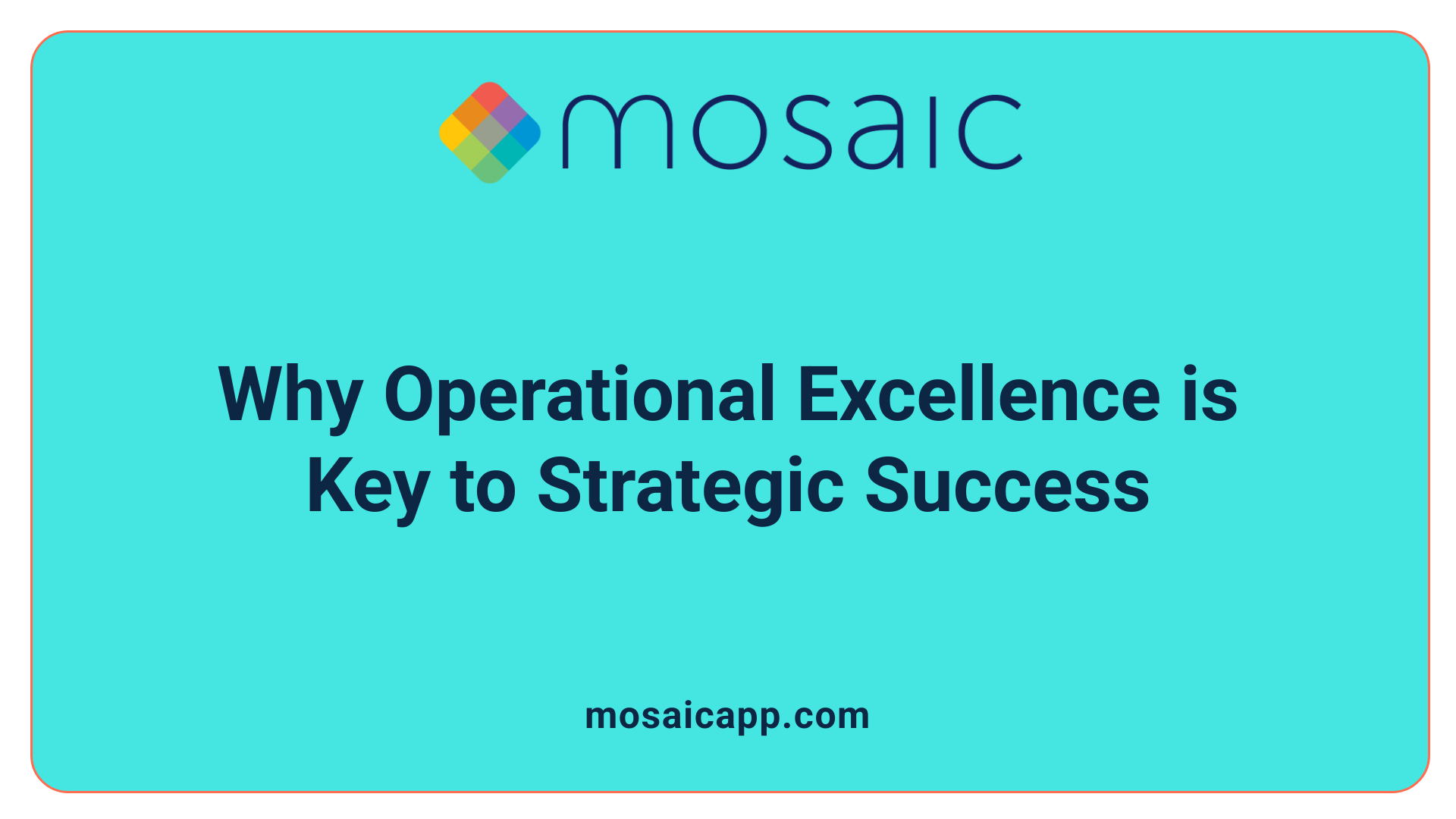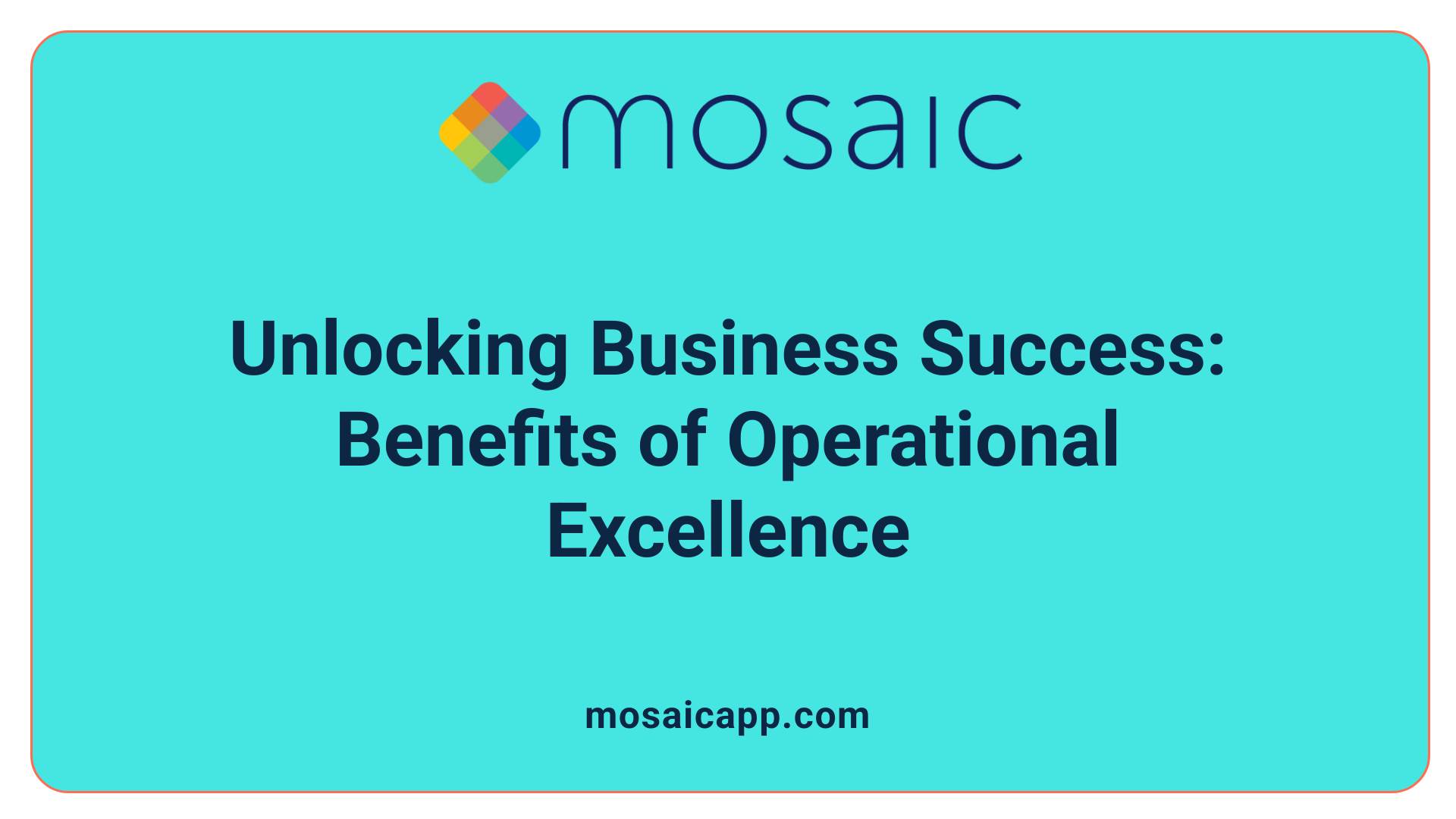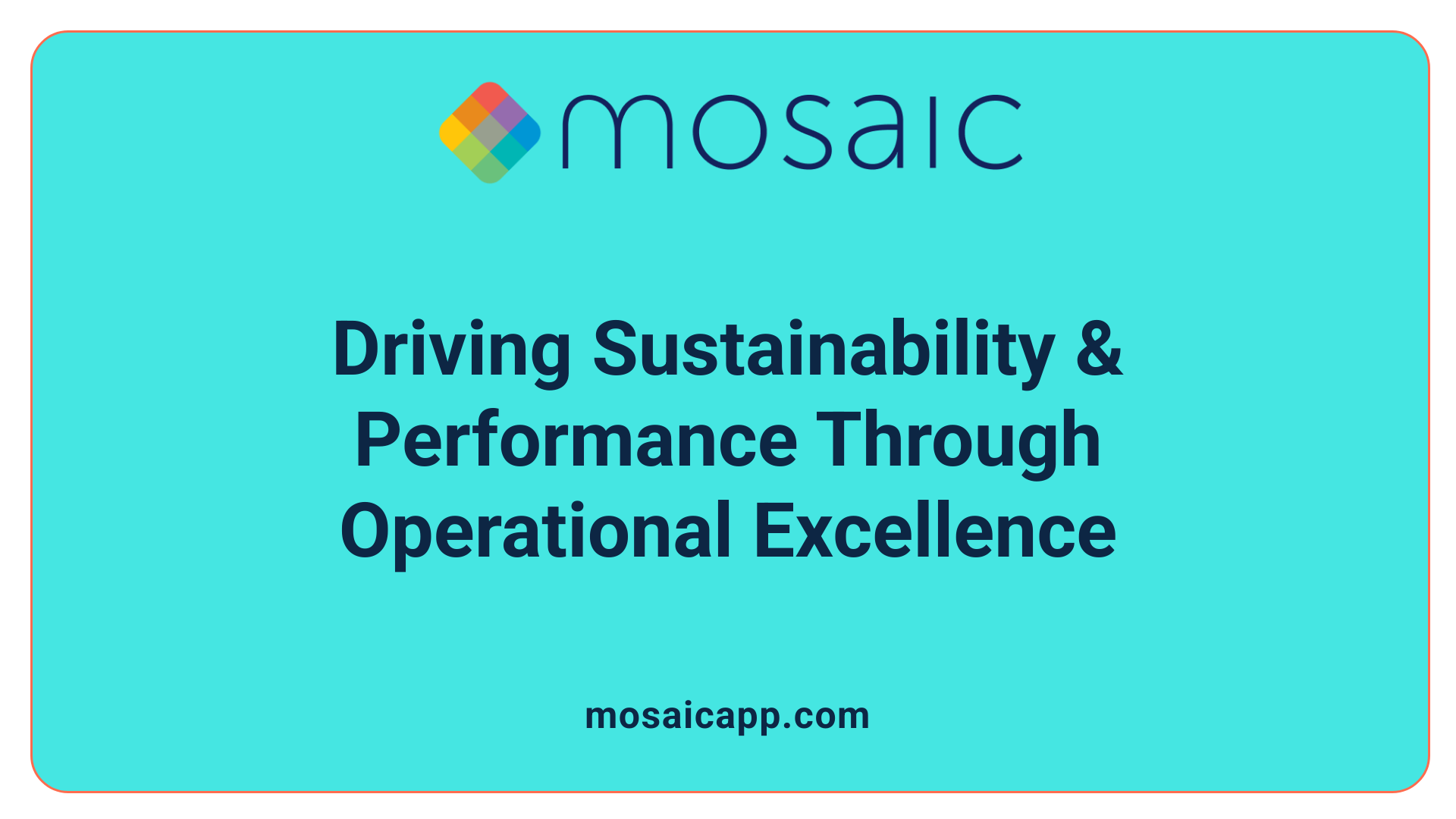Understanding the Foundations of Operational Excellence
Operational excellence is more than just a set of processes; it is a strategic mindset that organizations adopt to continuously improve performance, reduce waste, and deliver exceptional value to customers. As many companies recognize its importance, the number of organizations developing a structured approach to operational excellence is rising, with 33% actively building a process base according to the 2024 PEX Network’s State of the Industry Report. This increasing focus underscores the critical role operational excellence plays in fostering innovation, efficiency, and resilience in competitive markets.
Defining Operational Excellence and Its Core Characteristics

What is operational excellence and what are its key characteristics?
Operational excellence is a holistic management approach that focuses on the continuous improvement of organizational processes, quality, and efficiency. The aim is to deliver maximum value to customers while minimizing waste and reducing costs.
A fundamental trait of operational excellence is cultivating a culture of ongoing improvement. This involves empowering employees at all levels to seek ways to enhance processes, products, and services regularly. Such a mindset encourages innovation and sustains high performance over time.
Aligning strategic goals with daily operations is another core aspect. Organizations adopting operational excellence ensure that every department and team understands and works towards common objectives. This strategic alignment fosters coherence and unifies efforts across the organization.
Frameworks like Lean, Kaizen, Six Sigma, and the Shingo Model support these improvements by providing structured methods and tools. Lean thinking focuses on waste elimination and streamlining workflows. Kaizen promotes continuous, incremental change. Six Sigma aims to reduce defects and variation by using data-driven techniques.
Successful implementation of operational excellence involves establishing clear metrics such as cycle time, defect rate, throughput, and customer satisfaction. These measurements help organizations track progress, identify gaps, and refine processes.
Collaboration and systemic thinking are vital. Cross-functional teams work together to identify inefficiencies and develop solutions that optimize the entire value chain.
Ultimately, operational excellence strives to create a competitive advantage by consistently enhancing performance, reducing operational costs, and improving customer satisfaction. It is an ongoing journey that requires leadership commitment, organizational alignment, and a culture that values perpetual learning and improvement.
The Strategic Significance of Operational Excellence

Why is operational excellence important for organizations' strategic success?
Operational excellence plays a vital role in helping organizations stand out in competitive markets. By streamlining processes, reducing waste, and cutting unnecessary costs, it creates a sustainable competitive edge. This focus on efficiency allows companies to deliver higher quality products and services faster, which directly boosts customer satisfaction.
A culture of continuous improvement fosters innovation and employee engagement. It encourages teams across all levels to seek ways to enhance workflows and eliminate inefficiencies. This alignment of effort not only improves operational metrics but also supports strategic objectives.
Integrating the right mix of people, processes, products, and technology is essential. Technologies like AI, automation, and digitization enable end-to-end process transformation. When combined with strong leadership and a clear strategic vision, these elements help organizations adapt quickly to market changes, mitigate risks, and maintain resilience.
Setting and tracking KPIs such as cycle time, throughput, and customer satisfaction foster data-driven decisions. Cross-department collaboration ensures that operational improvements align with overall business goals, leading to sustained performance gains.
In essence, operational excellence is more than just an operational model; it is a strategic approach that empowers organizations to differentiate themselves, enhance efficiency, and deliver superior value to customers. It ensures long-term growth and resilience by aligning daily operations with overarching strategic aims.
Operational Excellence as a Competitive Differentiator

How does operational excellence serve as a competitive differentiator?
Operational excellence plays a pivotal role in setting organizations apart in competitive markets. By focusing on delivering higher quality products or services faster and at a lower cost, companies can significantly enhance customer satisfaction and loyalty.
This approach is rooted in the development of distinctive operational systems and processes that are difficult for competitors to replicate. These unique workflows and management practices serve as sustainable assets, providing a long-term edge that supports a company's market position.
Moreover, cultivating a culture of continuous improvement under strong leadership encourages innovation, employee ownership, and a proactive attitude towards workflow optimization. Such a culture not only accelerates responsiveness to market shifts but also strengthens resilience against operational risks.
The incorporation of advanced technologies like AI, robotics, and digitization further accelerates adaptation. They enable seamless workflow automation, eliminate redundancies, and improve data accuracy—contributing to superior efficiency and effectiveness.
In essence, operational excellence transforms basic business processes into strategic assets. It ensures organizations operate at optimal levels, deliver exceptional value, and maintain a competitive advantage. This comprehensive strategy promotes agility, reduces waste, and fosters high employee engagement, making it a vital differentiator for sustainable success.
Benefits and Outcomes of Achieving Operational Excellence

What are the benefits of achieving operational excellence for business success?
Operational excellence delivers a range of advantages that significantly impact a company's performance and market position. First, it increases efficiency and productivity by streamlining workflows, eliminating waste, and making better use of resources. This not only speeds up operations but also helps in reducing costs.
Enhanced customer satisfaction is another crucial benefit. By focusing on quality, timely delivery, and customer needs, organizations can build stronger relationships and boost loyalty. This customer-centric approach often results in higher retention rates and a more favorable reputation.
Employee engagement and empowerment also see a positive boost in an environment driven by continuous improvement. When teams are involved in process enhancements and understand their impact, morale improves and innovation flourishes.
Most importantly, operational excellence positions companies for sustainable growth. It provides a competitive edge by enabling quick adaptation to market changes, mitigating risks, and maintaining high performance even in challenging conditions.
By integrating these elements, organizations can achieve a resilient and efficient operation that drives long-term success.
Impact on Organizational Performance and Sustainability

How does operational excellence influence process streamlining and waste reduction?
Operational excellence plays a critical role in refining organizational processes by focusing on efficiency and waste elimination. Techniques such as Lean and Six Sigma are employed to pinpoint inefficiencies, minimize defects, and optimize workflows. This systematic approach not only shortens cycle times and improves quality but also results in significant cost savings. Through continuous evaluation and improvement, organizations can reduce excess inventory, energy consumption, and unnecessary steps, leading to leaner operations.
What are the cultural and technological aspects involved in promoting sustainability?
Sustainable operational practices are deeply rooted in organizational culture and supported by advanced technology. Cultivating a culture of continuous improvement encourages employees at all levels to identify sustainability opportunities actively. Leadership commitment fosters innovation and accountability, ensuring eco-friendly initiatives are prioritized. On the technological front, digital tools like IoT and workflow automation enable real-time monitoring of resource use and emissions, making it easier to implement sustainable practices and measurable environmental goals.
Which technologies support ongoing operational excellence?
Various cutting-edge technologies facilitate process improvement and sustainability efforts. IoT sensors track energy consumption and waste in manufacturing; blockchain enhances transparency in supply chains; AI optimizes scheduling and resource allocation; RPA automates repetitive tasks, reducing errors and manual labor. Business intelligence platforms and ERP systems provide data analytics to inform decision-making, ensuring that sustainability and efficiency are integrated into daily operations. These tools help organizations respond swiftly to environmental challenges while maintaining high performance.
How does operational excellence contribute to environmental and social sustainability?
Operational excellence aligns closely with environmental and social goals by promoting eco-efficient practices. Reduced waste and energy savings directly lessen ecological footprints. Green innovations, such as eco-design and sustainable sourcing, are often driven by a culture of excellence committed to long-term responsibility. Socially, operational excellence encourages fair labor practices, safety, and employee engagement, fostering a responsible organizational environment. This integrated approach enhances a company's reputation and stakeholder trust, securing social license to operate.
| Aspect | Focus Area | Supporting Technologies | Outcomes |
|---|---|---|---|
| Process Efficiency | Waste reduction, lean workflows | RPA, BI tools | Cost savings, faster delivery |
| Cultural and Leadership | Employee engagement, innovation | Leadership development, training | Culture of continuous improvement |
| Technology Adoption | Digital tools, automation | IoT, blockchain, AI | Transparency, sustainability metrics |
| Environmental Impact | Resource use, emissions | Eco-design, IoT sensors | Lower energy use, emissions decrease |
| Social Responsibility | Workforce safety, engagement | HR systems, performance KPIs | Higher morale, improved stakeholder relations |
Operational excellence seamlessly interlinks process optimization, cultural adaptation, and technological innovation to create sustainable value. It enables organizations to perform better, be environmentally responsible, and foster a positive social impact, thereby securing a resilient and competitive future.
Strategic Differentiation and Market Leadership
Operational excellence plays a vital role in helping organizations distinguish themselves in competitive markets. It enables firms to deliver consistent, high-quality products and services efficiently, creating a unique value proposition that sets them apart from rivals. Rather than focusing solely on operational effectiveness, strategic differentiation involves leveraging excellence in core processes to build a brand reputation rooted in superior customer satisfaction, innovation, and reliability.
Integrating operational excellence with strategic planning is crucial for long-term success. When organizations align their continuous improvement initiatives with overall business goals, they cultivate a resilient market position. This strategic integration allows companies to respond quickly to market shifts, optimize workflows, and maintain a competitive edge.
Innovation and responsiveness are closely tied to operational excellence. By adopting advanced technologies like AI, robotics, and digitization, organizations can transform their operations from end-to-end. These tools facilitate rapid adaptation, streamline operations, and foster innovation—further differentiating the company and fueling sustainable growth.
Leading firms develop customized management systems and cultivate a culture of continuous learning and improvement. Such cultural elements create barriers to imitation, as they embed core values and practices that support market leadership. The use of strategic Centers of Excellence enhances this advantage by concentrating expertise and standardizing best practices across the organization.
Ultimately, operational excellence not only enhances efficiency and quality but also serves as a strategic foundation for differentiation. It aligns operational processes with strategic goals, enabling organizations to stand out, respond swiftly to market demands, and secure a lasting competitive position.
Operational Excellence and Broader Strategic Initiatives
How does operational excellence integrate with strategic planning?
Operational excellence is fundamentally aligned with an organization's strategic planning. It functions as a core framework that supports achieving long-term goals through a focus on process optimization, waste reduction, and continuous improvement.
Organizations that embed operational excellence into their strategic planning can better synchronize their operational activities with vision and objectives. This alignment ensures that every process and resource is geared toward supporting overarching business strategies such as market expansion, product innovation, or customer satisfaction.
Leadership plays a vital role by championing culture change and fostering an environment where continuous improvement is part of the strategic roadmap. Techniques like Lean, Six Sigma, and digital transformation are often used to translate strategic ambitions into operational realities.
How does operational excellence support innovation and growth initiatives?
Supporting innovation and growth is a primary benefit of operational excellence. By streamlining workflows, eliminating redundancies, and leveraging digital tools like AI and automation, companies create an agile infrastructure to pilot new ideas quickly.
For instance, automating routine tasks frees up employee time to focus on innovative activities that add value. Technologies such as robotics and digitization are enabling end-to-end workflow enhancements, making scaling new products or services more feasible and efficient.
An organizational culture rooted in continuous learning encourages experimentation and adaptation, pivotal for growth initiatives. When operational processes are optimized and resilient, companies can respond more swiftly to market demands and customer expectations.
How does operational excellence drive continuous improvement across the organization?
At its core, operational excellence fosters a mindset of ongoing enhancement throughout all levels of the organization. Using tools like Process Managers—for documenting, discovering, and automating processes—organizations can identify pain points and implement quick improvements.
Regular performance measurement through KPIs such as cycle time, defect rates, and customer satisfaction helps teams track progress and set realistic targets. Leadership support and employee ownership further embed continuous improvement as a shared responsibility.
Furthermore, integrating technologies such as RPA, BI, and IoT facilitates real-time data analysis, making it easier to spot inefficiencies and act promptly. This relentless pursuit of operational perfection helps organizations stay competitive, adaptable, and ready for future challenges.
| Aspect | Focus Area | Role in Strategic Growth |
|---|---|---|
| Integration | Strategic Alignment | Ensures operational activities support corporate goals |
| Innovation | Automation & Digital Tech | Accelerates deployment of new products/services |
| Improvement | Culture & Tools | Sustains ongoing enhancements and competitive edge |
Operational excellence, therefore, is much more than an efficiency program; it is a strategic enabler that transforms organizational capabilities, fueling innovation, growth, and resilience.
Embracing Continuous Improvement for Future Success
Incorporating operational excellence into the core strategic fabric of an organization is not a one-time effort but a continuous journey. It requires committed leadership, a culture of ongoing learning, and leveraging technological advancements to sustain competitive advantages. As exemplified by industry leaders such as Amazon, Toyota, and Walmart, operational excellence is fundamental to achieving superior performance, adapting to market dynamics, and building resilient, customer-centric organizations. The strategic integration of operational excellence with broader organizational initiatives empowers companies to not only succeed today but to thrive in the evolving future landscape, making it a vital differentiator in competitive markets.
References
- Operational excellence is your organization's strategic ...
- What is Operational Excellence and Why is it Important ...
- What is Operational Excellence? Tips + Best Practices
- Differentiate yourself through operations: a roadmap to ...
- What is Operational Excellence Strategy?
- An Introduction to Operational Excellence
- What Is Operational Excellence? Here's How to Reach It
